Camp Resolution, the self-governing encampment for unhoused Sacramento residents, received a notice on March 28 for its nearly one hundred members to vacate by May 16, preceding the camp’s clearance on June 1.
On May 15, the residents and their allies organized and marched to City Hall, saying “no.” The city first extended the timeline for removal to May 31. Then the city called off the eviction on June 9.
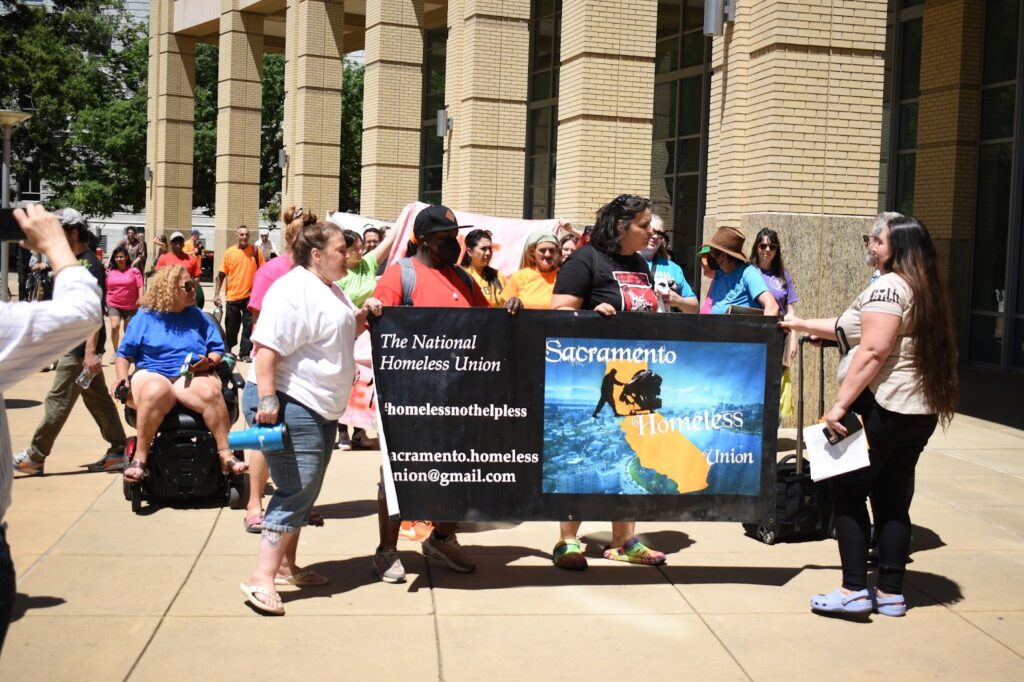
(Camp Resolution Advocates Gathering Outside City Hall, Photo by Isidore Mika Székely Manes-Dragan)
Earlier this week, the Sacramento Homeless Union and camp residents announced that the city rescinded termination of the camp’s lease. Assistant City Manager Mario Lara sent this notice: “[P]lease accept this as the City of Sacramento’s formal recission [sic] of its Notice of Termination of the Camp Resolution Lease. The City considers the lease, and all rights and obligations of the parties thereunder, to be in full force and effect.”
The camp residents learned of the looming eviction from lawyer Mark Merin, who represents Safeground, a nonprofit that currently provides city-sanctioned ground for homeless shelter, and manages the relationship between Camp Resolution and the city.
The residents stated their intention to fight back, and so throughout the month of May, their chants have been heard on the streets of downtown.
“Who are we? Camp Resolution!
What do we want? Housing!
When do we want it? Now!
If they don’t give it to us? Shut it down!
What else do we want? Stop the sweeps!”
The campers began at the courthouse to serve a notice demanding the city to follow the terms of the lease, which renews automatically every 120 days until everyone at the camp is housed affordably and permanently. Then they marched to City Hall where several residents and advocates met with the press.
Crystal Sanchez, president of the Sacramento Homeless Union and a liaison at Camp Resolution, spoke on the nature of the camp’s conflict with the city. “The definition of oppression is cruel or an unjust use of authority or power,” she said. “Oppression comes in many forms for the homeless community, which is traumatizing not only to our homeless community but our communities as a whole. These oppressive systems create a cycle of poverty, instability and suffering. This looks like years of forced migration in the form of sweeps. To fund systems that never intend to resource or house. To violent cycles of displacement and losing everything at the hands of authority figures. To a set of false narrative and set of expectations of hopes to the unhoused and to the community as a whole. What’s left is the remnants of broken promises, broken contracts, that the city of Sacramento continues to hand down to this community. Big business here looks like what we call ‘poverty pimping.’ Millions of dollars coming down on behalf of backs laying on the streets that were never actually intended to go to them or support them.”
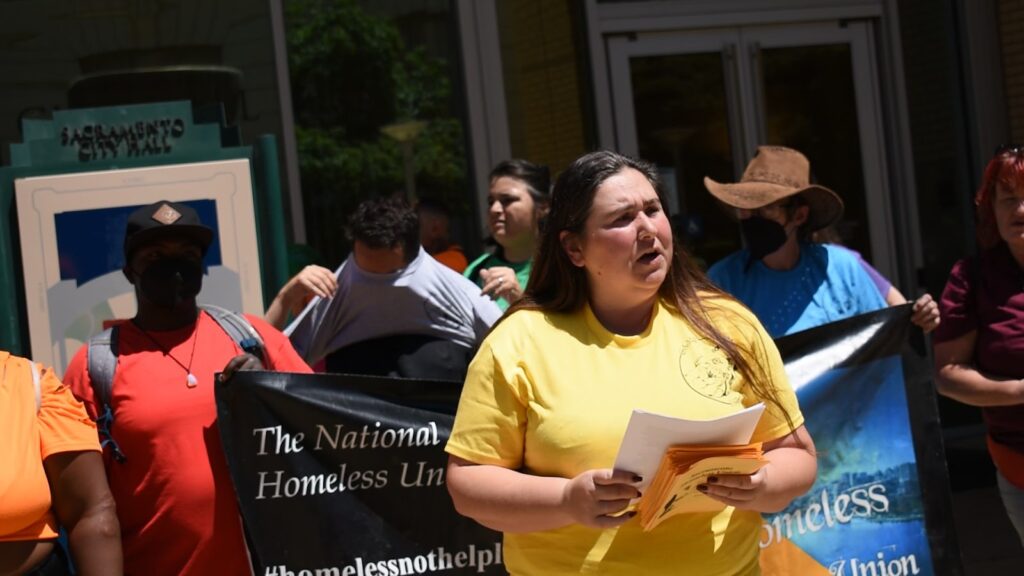
(Crystal Sanchez speaking at City Hall in front of the banner of the protestors, Photo by Isidore Mika Székely Manes-Dragan)
Sanchez called upon the crowd to ask if they have received that funding in any way, shape, or form, to which the crowd called back, “NO!”
Additional speakers addressed the crowd. Tamatha, a resident at Camp Resolution, said, “All they give us is a bus pass and food stamps. We know where we want to go, we need services.” Donald Cooper, another resident speaker, added that residents got everything they needed on their own.
Camp Resolution members see the encampment as a safe haven from recurring violence and trauma. “I don’t even wanna call it a camp—it’s home. It’s community,” Sanchez said. She cited some important statistics reflecting the general homeless population: Of the 48 current residents, 44 have a disability, and all reported a chronic health illness or major health diagnosis. Most of the camp’s residents are 45 or older.
“The camp itself is a resemblance to what is actually on our streets currently,” Sanchez added. “Camp Resolution has always been about the fight to not only protect the residents of Camp Resolution but to those experiencing homelessness as a whole as it, and many other organizing brothers and sisters came out of a statewide fight started in 2019 by the Union. There are union members and camps across the state fighting for something similar to what Camp Resolution has been able to accomplish.”
Camp Resolution council member Susan Alhaqq also touched on the violence of sweeps. “I’ve been homeless for 13 years,” she said. “And I’ve been swept, had everything taken away from me. I felt l was less than a person, they took that from me.”
Camp Resolution costs only $3,900 to run, according to Sacramento’s city audit, whereas operating costs from First Step Communities for equivalent services cost $3.3 million. With minimal cost to the city, advocates see little justification for eviction.
Anthony Prince, a lawyer representing the Sacramento Homeless Union and Camp Resolution in regards to the specific performance order, criticized the city and its practices regarding homelessness. “Let me start by saying that this is a clear cut-case of breach of contract,” he said of the eviction order. “This is a legal issue and political issue. There is no question in our minds that the undue influence of this district attorney is putting pressure on the city which the city was only happy to accept and then turn around and intensify the sweeps all across the city of Sacramento. There is only one place in Sacramento that is legally immune from those sweeps because the people there fought tooth and nail to get that space and that space is named Camp Resolution, am I right?”
(Lawyer Anthony Prince speaking in solidarity with the protestors from Camp Resolution who he supports in fighting the lawsuit with the state, Photo by Isidore Mika Székely Manes-Dragan)
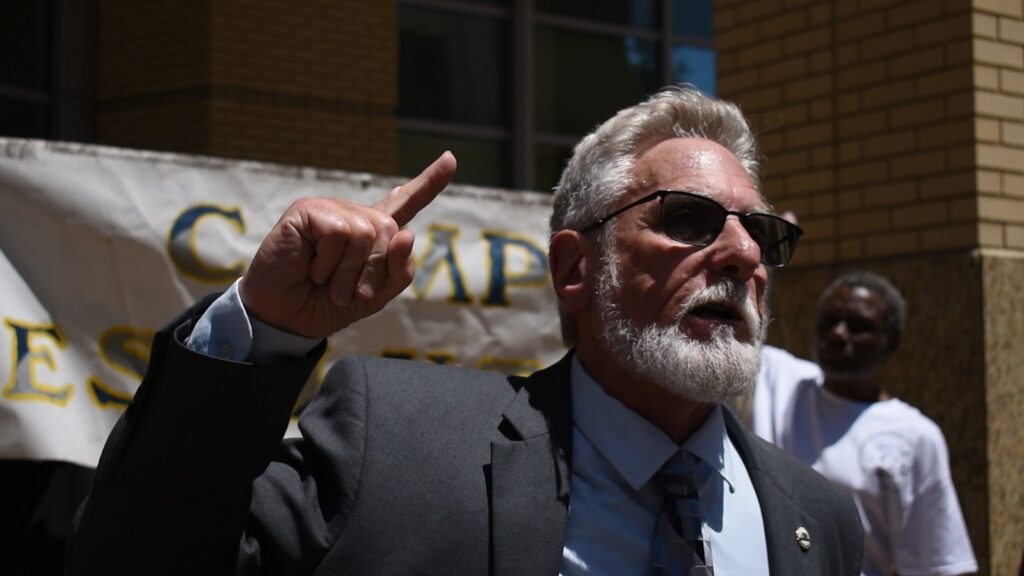
The lawsuit also calls on the city to honor the lease terms with Camp Resolution, especially clauses that name residents as beneficiaries and that provide for automatic lease renewals every 120 days until everyone is provided permanent housing.
But the city claims in its eviction notice that the camp is in violation of the Central Valley Water Control Board Variance, which states that vehicles may stay only on the paved portion of Camp Resolution. If the camp can move the trailers on the lot’s unpaved area to the paved one, it would seem that the city would no longer need to evict them, but other legal threats from the city contradict this. The Sacramento Homeless Union claims the city could easily renew the variance at any point, but chose to let it expire instead of getting a waiver from the water board. When asked why, city spokesman Tim Swanson referred to a November 14 document from 2023 from District Attorney Thien Ho ordering the closure of Camp Resolution.
Prince countered that the city was granted the variance before Camp Resolution was established. “What Assistant City Manager Mario Lara didn’t say is that the fact that the variance that went for two years is to accommodate the city … before people organized in Camp Resolution and the city was anticipating that the camp would only be there for a short time, but that is not how it worked out because we fought, we organized,” he said. “We fought in the courthouse on the corner, and we fought in the court of public opinion, and that means that Mr. Lara is in for a rude awakening when you realize that you can’t breach contracts, tear up agreements and think there would be a consequence so we told the city that they had to rescind that lease termination notice.”
The May 16 deadline arrived, but no eviction took place. The city declared they would postpone the eviction until an agreement for affordable housing was reached, but the lease remains as of this writing unrenewed.
On May 28th, as the city discussed the lawsuit during a closed session, the camp descended upon downtown again to march from the Capitol Building to the city hall.
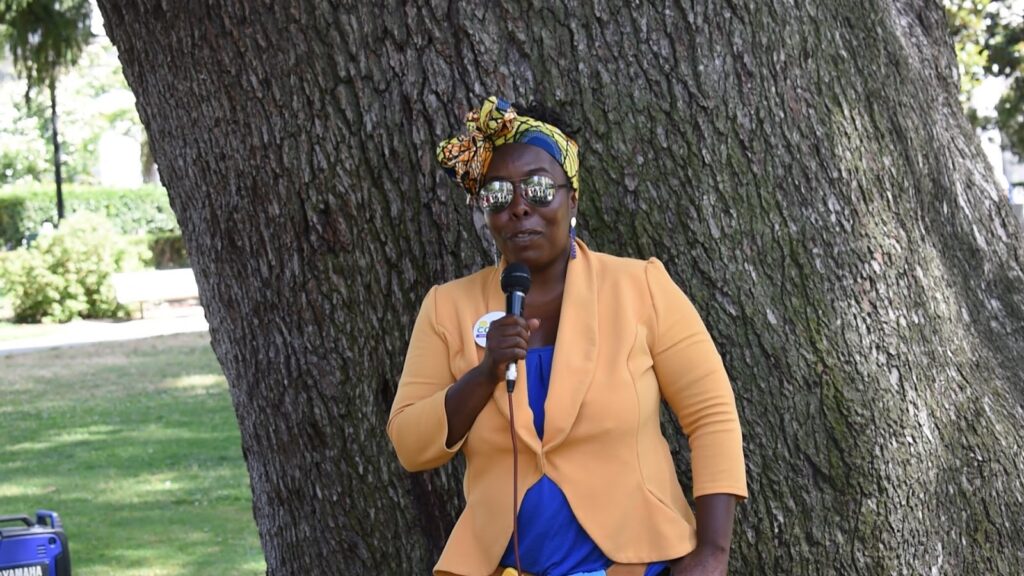
(Dr. Flo speaking in advocacy of Camp Resolution in front of the Capitol Building, Photo by Isidore Mika Székely Manes-Dragan)
At the Capitol, the camp and its advocates spoke about the lawsuit and the struggles surrounding life at the camp, as well as its upsides compared with the struggle of homeless living before the camp. One such advocate is mayoral candidate Flojaune Cofer, who argued the city should live up to the terms of the contract. “That agreement was [that] until the people of Camp Resolution were found permanent housing that the camp would remain open,” she said. “I’m frustrated because the city could have done more under the current agreement, to make sure that there’s water on site and electricity on site.”
Cofer had previously experienced self-governance when living in Michigan, which made her sympathetic to those living in the camp. Additionally, her experience as a public health professional has made her conscious of the residents’ health concerns, knowing that constant displacement lowers life expectancy.
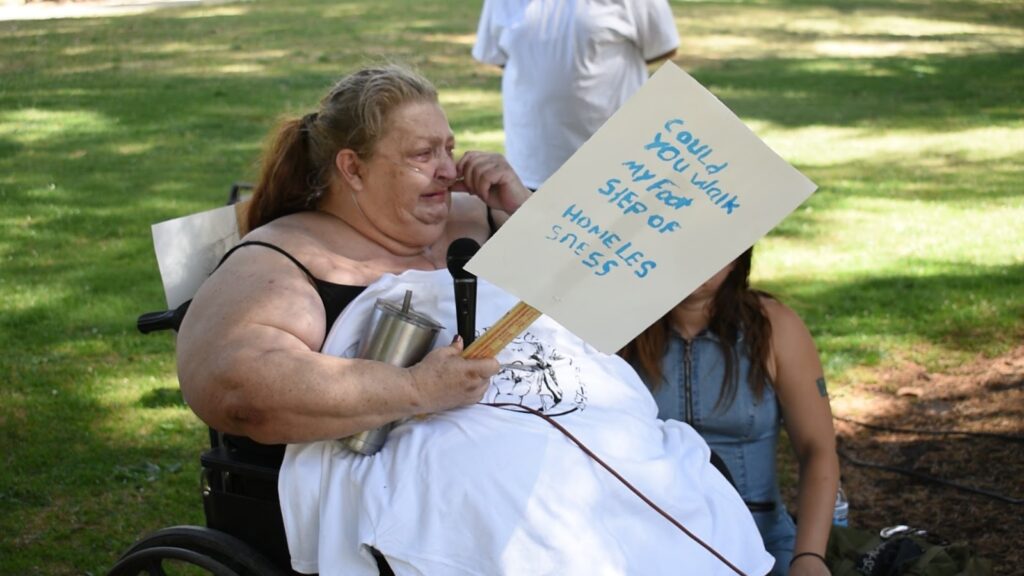
(Shonn, Camp Resolution resident, speaking through tears at the May 28th Rally, Photo by Isidore Mika Székely Manes-Dragan)
Shonn, a camp resident who moves in a wheelchair, shared a touching story about her experience with disability and homelessness. “I got chased around by the cops, and people who weren’t even homeless stealing my stuff,” she said through tears. “My generator so I could breathe, my truck so I could move my trailer: gone. These are people with houses who took my stuff. Now finally I got to Camp Resolution. I didn’t have to run no more, I didn’t have to be scared no more. I can’t lose that place. I can’t go back out like I was.” A crowd member called out, “You’re not goin nowhere ‘til we get you a house.”
Shonn told the crowd about her experience becoming disabled and the dehumanization that homelessness brings. “You people need to know we are people, we do care, I raised three kids here, I went to work, I went to college. I did those things. I studied three years in community college to be a vet tech. I had three kids. I came home from work I could barely walk, I had to use the walls to walk, and get up the next day, go back and work. I didn’t want to be here, I don’t wanna live like this, I want to take a shower. I haven’t taken a shower in years. I dump a bucket of water on my head every day. It’s ridiculous. I am a person and I deserve to be treated like one.”
Satearah Murphy, camp resident, added in support, “No air, no amenities. I still gotta wash my butt like I’m outside, I still gotta cook like I’m outside, while cooking while I’m inside. You know? So that’s what housing is to me: an opportunity.”
(Camp Resolution advocates descend upon City Hall on May 28th, 2024, Photo by Isidore Mika Székely Manes-Dragan)
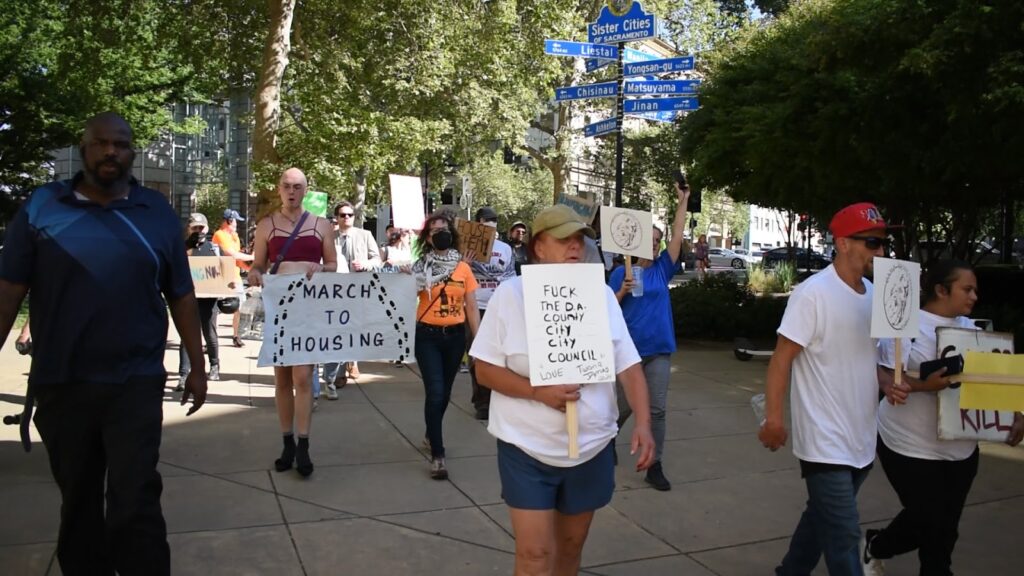
After marching to City Hall, advocates entered City Hall to comment on homeless spending, joined by members of LGBTQ+ and Jewish organizations.
The camp’s advocates spared a few harsh words for the council, telling them exactly how they believe they should proceed in regards to the lawsuit and why it would be beneficial for their bottom dollar to do so. Many speakers focused on demanding nothing but water and electricity and to be left alone at the camp and, or otherwise continue to place homeless people into housing.
“I ask you, truly do better, because this is cyclical violence,” said one commenter. “A person died within the past two weeks right outside that door,” referring to the body of a homeless individual found in front of City Hall earlier in the month. Commenters got their point across regardless of the 2-minute time limit imposed for comments, often speaking over the cut microphones loudly enough for the audience to hear, with a valiant fervor in their hearts to get their demands met at any cost.
Delphine Brody blasted the council, continuing after their mic was cut off. “Working tirelessly setting up the systems of community mutual aid that you’ve been blowing off in favor of using your organized terrorism force to steal their belongings, hounding them literally to death,” they said. “Where’s our housing first? Where’s our rent control? Where’s our training on the new issues? You spend all your time chasing people, stealing their shit!”
After March 28, the city announced it would extend the deadline for Camp Resolution to leave to May 31, which passed without any evictions. Two months later, the threat of removal has now passed.
With the power of resilient campers and swift legal action from the Homeless Union, Camp Resolution remains a unique project providing safety, support and a future for its community inside and out of its gates.

Hello my name is Satearah Murphy id love to give you a update on how camp Resolution residents are doing today now that we are back in tents after being pushed out of our trailers